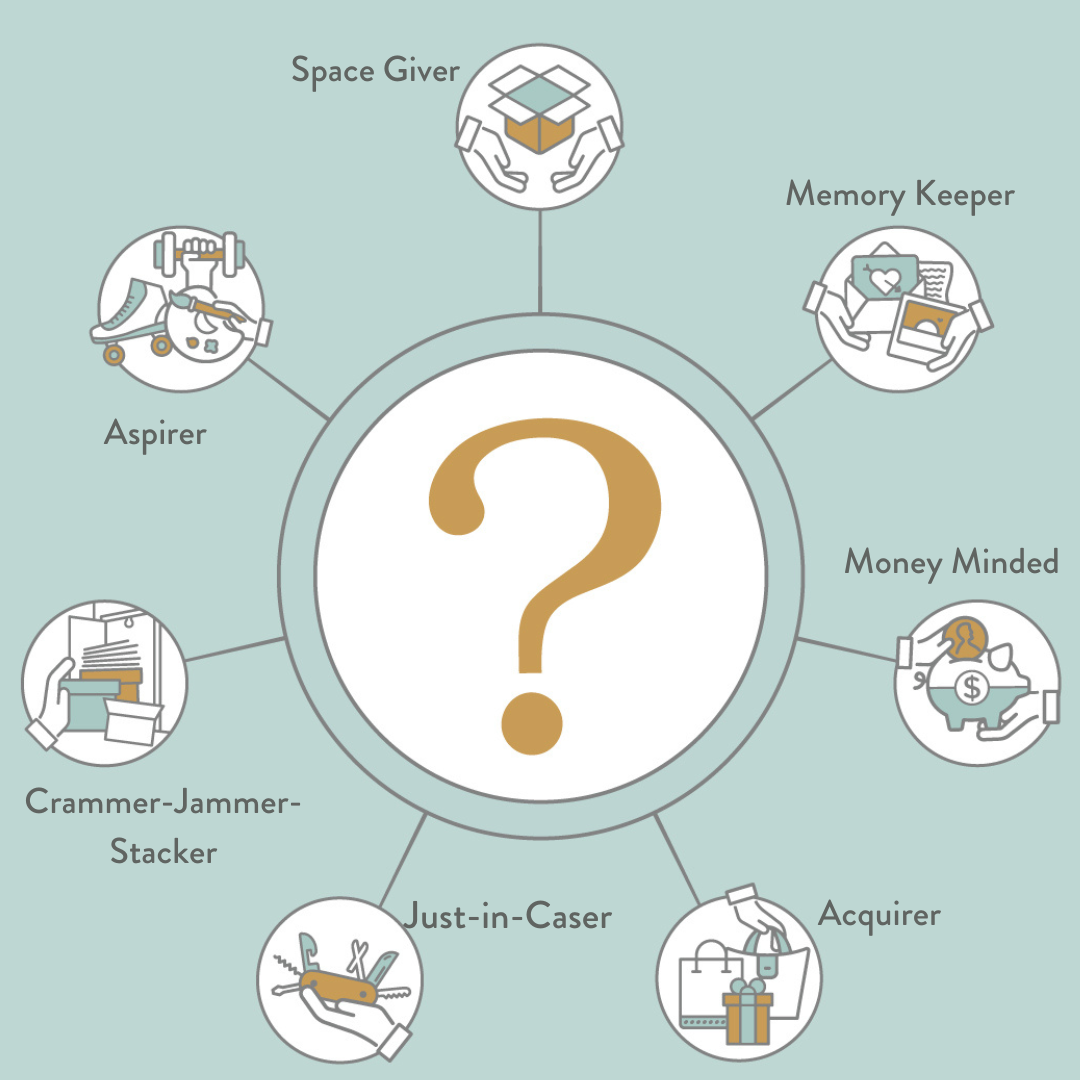Over the last decade, we have spent thousands of hours working closely with clients as we untangle the chaos in their lives. Our Bees recognize that in order to get to the heart of a clutter problem, we need to understand what is preventing folks from getting and staying organized. We developed the Organizing Profiles to give our organizers (and you!) a head start in figuring out the relationship between you and all of your stuff. You can find out which profile most closely represents you by taking our short Profile Quiz! Understanding the relationship between you and your clutter can BEE the first step toward finally taming the disorganization in your home.
1The Space Giver
Space Givers are people who frequently give up their storage space for others. Whether it’s keeping a few crates for your sister, letting your neighbor store their excess in your shed, or allowing your grown children to keep all of their memorabilia in their childhood bedroom even though they now own their own home, Space Givers have a hard time saying no to requests for storage. For Space Givers, the clutter relationship is not with the items, but with the owners of the items.
If you are in the habit of prioritizing others’ needs over your own, it can be a challenge to give yourself permission to reclaim your space. But if you want to get control of your clutter, you will need to have conversations with the owners of the items you are storing to make a plan and timeline for when they can reclaim their stuff—so that you can reclaim your space!
2 The Memory Keeper
Memory Keepers tend to be deeply sentimental and nostalgic, and they hold on to items as a way of preserving family history and precious memories. They worry that getting rid of an item that has emotions attached to it will erase the memory—or that they’ll feel guilty about letting things go that have sentimental value. For Memory Keepers, the clutter relationship is not with the items, but with the memory they represent.
If you are a Memory Keeper, try to remind yourself that if everything is special, then nothing is special. Give yourself permission to hold on to those items that are most meaningful to you, and let go of those things that you feel obligated to keep but bring you no happiness.
3 The Money-Minded
If you are the kind of person who hates throwing away things because it feels wasteful, you just might fit into this category. Our Money-Minded folks are cost-conscious and try not to spend money—even on things that really need an update. We find that they often feel guilty getting rid of unused items, so they hold onto things on the off-chance that someday, somewhere, somehow, they’ll be able to put the items to use. For the Money-Minded, the clutter relationship is not with the items, but with the money that was spent on them.
If this describes you, ask yourself if you would truly miss the item if it was gone—how often do you actually use it? If you don’t still love, need, or use the item, it’s okay to let it go. Maybe you can even sell it to recoup some of its cost!
4 The Just-In-Caser
Are you one of those people who other people turn to in an emergency—the neighbor that has every conceivable tool in their garage or appliance in their kitchen? Do you hear yourself consider getting rid of something but then decide to keep it just to be on the safe side? If you are always planning ahead for hypothetical needs and wants, you might be a Just-In-Caser. For our Just-In-Casers, the clutter relationship is purely circumstantial, not personal.
As we like to tell our clients, “Store things at the store!” Do you really need to stockpile items that aren’t relevant in your life right now? When was the last time you actually needed that 16th folding chair or the gourmet sandwich press? Prioritize your time, money, and space for your current reality rather than what might happen.
5 The Acquirer
Do you find yourself picking up items simply because they’re a great deal or because something caught your eye in the moment? Acquirers love shopping—it’s fun, exciting, and rewarding. But sometimes, the joy comes from the act of acquiring rather than from the actual items themselves. This can lead to an overwhelming amount of stuff that doesn’t always have a clear purpose or place. For Acquirers, the relationship is not with the items, but with the thrill of the hunt.
If you’re an Acquirer, try to focus on quality over quantity. Before bringing something new into your home, ask yourself whether you really need it or if you already own something similar. Being mindful about what you buy can help you enjoy the thrill of the hunt without accumulating unnecessary clutter.
6 The Crammer-Jammer-Stacker
Your home looks neat and tidy—until someone opens a drawer, a closet, or (heaven forbid) the garage. Crammer-Jammer-Stackers are masters of the quick clean-up, tucking things away wherever they’ll fit. While this method might make a space look organized, there’s usually no system in place, which can lead to frustration when trying to find things later. Over time, this type of clutter can become stressful and overwhelming—even if it’s mostly out of sight. For Crammer-Jammer-Stackers, the clutter relationship is burdensome and overwhelming.
If you suspect you might be a Crammer-Jammer-Stacker, ask yourself whether this system is working for you! Is your system wasting your time and money and causing you extra stress? Instead of stashing things wherever they fit, try to tame the chaos one space at a time. That will allow you to feel a sense of calm, not dread, when you open that drawer or closet.
7The Aspirer
Aspirers are dreamers. They have big plans for the future—whether it’s learning to paint, taking up golf, or starting that strength-training program your friend told you about. Because of this, they tend to accumulate items that represent their future selves rather than their current reality. If your house is filled with unopened craft supplies, unused gym equipment, or stacks of books waiting to be read, you might be an Aspirer. With Aspirers, the clutter relationship is not with the items, but with the potential that those items represent.
If you think you might be an Aspirer, give yourself grace. It’s utterly wonderful to have aspirations and goals, but it’s also okay to change your mind. Before holding onto something indefinitely, ask yourself whether holding on to the item makes you feel inspired or guilty? Instead of keeping physical reminders of who you want to be, consider creating a vision board or a goal list—and hold off on purchases until you have blocked out the time and mental energy to begin!
Understanding your organizing profile can be the first step toward creating a home that feels more functional, peaceful, and you. The key is recognizing the patterns that keep you stuck in clutter and making small, intentional changes that help you take control of your space. And if you ever need help simplifying your Hive, you know you can call in the Bees!



